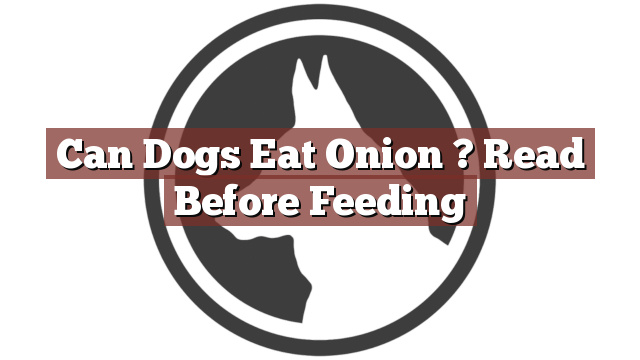Understanding Your Dog’s Dietary Needs
As a responsible dog owner, it is crucial to understand your furry friend’s dietary needs. Dogs have specific dietary requirements that differ from humans, and it is essential to provide them with a balanced and nutritious diet to ensure their overall health and well-being. While some human foods are safe for dogs to consume, others can be harmful or even toxic to them. Before introducing any new food into your dog’s diet, it is crucial to do thorough research and consult with your veterinarian.
Can Dogs Eat Onion? Read Before Feeding
Can dogs eat onion? This is a question that many dog owners may wonder. The answer is a resounding no. Onions, along with other members of the Allium family such as garlic, chives, and leeks, contain compounds that are toxic to dogs. These compounds, known as thiosulphate, can cause anemia in dogs by damaging their red blood cells. The toxicity levels can vary depending on the size of the dog and the amount of onion consumed. Even small amounts of onion can be dangerous for dogs and should be avoided at all costs.
Pros and Cons of Feeding Onion to Your Dog
While onions may add flavor to our meals, they pose serious health risks to our canine companions. The cons of feeding onion to your dog far outweigh any potential benefits. Consuming onions can lead to a condition called hemolytic anemia, where the red blood cells are destroyed, resulting in a lack of oxygen throughout the body. Symptoms of onion toxicity in dogs may include weakness, vomiting, diarrhea, pale gums, rapid breathing, and even collapse. In severe cases, it can be fatal.
On the other hand, there are no significant pros to feeding onion to your dog. Dogs have different nutritional needs than humans, and there are safer alternatives to add flavor to their meals. It is always best to stick to a well-balanced, commercial dog food that meets the specific nutritional requirements of your four-legged companion.
Conclusion: Know the Risks and Keep Your Dog Safe
When it comes to the question of whether dogs can eat onion, the answer is a firm no. Onions, along with their close relatives, are toxic to dogs and can lead to severe health issues. As a responsible pet owner, it is vital to educate yourself about the foods that are safe or harmful to your dog. Always consult with your veterinarian before introducing any new food into your dog’s diet.
Remember, prevention is key. Keep onions and other members of the Allium family out of your dog’s reach. If you suspect that your dog has ingested onion, contact your veterinarian immediately. By being informed and taking necessary precautions, you can ensure the well-being and safety of your beloved canine companion.
Thank you for taking the time to read through our exploration of [page_title]. As every dog lover knows, our furry friends have unique dietary needs and responses, often varying from one canine to another. This is why it's paramount to approach any changes in their diet with caution and knowledge.
Before introducing any new treats or making alterations to your dog's diet based on our insights, it's crucial to consult with a veterinarian about [page_title]. Their expertise ensures that the choices you make are well-suited to your particular pet's health and well-being.
Even seemingly harmless foods can sometimes lead to allergic reactions or digestive issues, which is why monitoring your dog after introducing any new food item is essential.
The content provided here on [page_title] is crafted with care, thorough research, and a genuine love for dogs. Nevertheless, it serves as a general guideline and should not be considered a substitute for professional veterinary advice.
Always prioritize the expert insights of your veterinarian, and remember that the health and happiness of your furry companion come first.
May your journey with your pet continue to be filled with joy, love, and safe culinary adventures. Happy reading, and even happier snacking for your canine friend!

